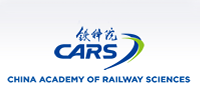China Academy of Railway Sciences (CARS)
Join our community for FREE today!
Create and share your own profile
Join the discussions
Publish your own items
Subscription to our Weekly eNewsletter
Get connected with Mass Transit Professionals Worldwide
FREE membership benefits
- * create and share your own profile
- * join the discussions
- * publish your own items on Mass Transit Networkmanage news, jobs, tenders, companies, events, showcases, educations, associations and literature.
- * subscribe to our eNewsletter
Association information
Since its establishment more than 50 years ago, the China Academy of Railway Sciences (CARS) has undergone five major historical stages: establishment, improvement, the Cultural Revolution, rehabilitation and vitalization as well as reform and development, which are full of frustrations and achievements. The history of CARS is closely related to the railway construction of the People’s Republic of China. In November 1949, when the P.R.C. was founded for only one month and everything needed to be rehabilitated, the Ministry of Railways decided to establish a railway scientific research institution. On 1st March 1950, the Railway Technology Institute of the Ministry of Railways was formally founded in Tangshan with Tang Zhenxu as the president. In September the same year, the name was changed into Railway Research Institute of the Ministry of Railways and its leading body was then moved to Beijing. Dr. Mao Yi-sheng, a famous scientist, educationist and bridge engineering expert, was appointed as the president of the institute by the Government Administration Council of the Central People’s Government.
Since 1950s, CARS has been following the principle of “all for scientific research and scientific research for transportation”. It organized personnel and material resources to revitalize the war-torn railway network and construct new lines. After the Railway Research Institute was expanded to the China Academy of Railway Sciences (Dr. Mao as the president) in 1956, the technical personnel participated in the compilation of 1956-1967 Perspective Planning of Railway Science and Technology Development and undertook its execution.
In 1960s, eight research institutes of CARS with more than 370 technical personnel hosted or participated in the mass campaign of the Chengdu-Kunming Railway and overcame many difficult technical problems, a tremendous contribution to the railway construction. The Chengdu-Kunming Railway is located among Southwest Mountains, which is rich in high mountains and complicated in geology. Furthermore, they participated in the research, experiment and solution for the Nanjing Yangtse River Bridge, Hongshuihe River Cable-stayed bridge on the Hengyang-Pingxiang Line, as well as Han River thin-wall box steel beam slant-legged rigid frame bridge in Ankang, which represent the advanced level of China’s bridge construction technology.
In 1980s, a great number of technical backbones devoted themselves to “the construction of Datong-Qinhuangdao Railway, Hengyang-Guangzhou Railway and Railways in the middle part of China”, and took on the responsibility of tackling key technical problems of the double-track electrification of 10,000t heavy haul Datong-Qinhuangdao Coal Railway and the Dayao Mountain double-track long tunnel as well as the expansion of passenger train consist and train operation safety assurance. In 1990s, CARS played a principal role in the technical problems settlement of the Guangzhou-Shenzhen Quasi-high-speed Railway, speed-up research and experiment on existing mainlines, research of general techniques and key techniques on Beijing-Shanghai High-speed Railway, train ticketing system as well as the associated projects of Beijing-Kowloon Railway construction.
The past 50 years have seen CARS grow into a comprehensive institution with multiple disciplines and specialties and a center of scientific research, experiment, industrial products and material inspection, scientific and technical information, and standard and metrology. In CARS, there is a staff of 2359, of which 1640 are professional technical personnel accounting for 69% of the total. In addition, there are 510 people with senior technical titles and 755 medium level technical titles.
Since its establishment, CARS has undertook several thousand scientific research topics centering around such subjects as rock engineering and geo-engineering, track structure, c. w. r. track, bridge and tunnel construction, hydraulic and hydrological engineering, engineering blasting, structural vibration, subgrade in desert or permafrost, prevention and control of landslide and debris flow, automation of marshalling yard, station computer control, dispatching control, radio communication, optical fibre communication, data transmission, computer application, metal and non-metallic new material and techniques, non-destructive flaw detection technique, automatic detection, passenger and freight transportation organization, transport economy, loading and unloading equipment, fundamental standard, scientific and technological information as well as soft science research. CARS has succeeded in achieving 2684 items of scientific and technical results with 159 items rewarded with State awards and 611 items Provincial and Ministry awards. Meanwhile, CARS has opened up new market energetically and speeded up the transformation from laboratory test to market technology.
CARS has always been attaching great emphasis on the personnel training, and has educated lots of technical talents during the development of scientific research. After 1978, CARS has continually been qualified to confer master degree in thirteen specialties and doctor degree five. In addition, there are two post-doctoral research centers in CARS. Up to present, more than 500 graduates applying for doctor and master degrees have completed their education. CARS publishes twelve kinds of academic and technical publications (including two internal publications), and has a library with a collection of over 300,000 copies of books, documents and papers. Backed by the related departments and the Ministry of Railways, CARS actively strengthens the international cooperation and exchanges as well as extends cooperation fields. It has established multi-level and multi-channel communication and cooperation relations with the International Union of Railways, International Heavy Haul Association, more than ten countries and world famous enterprises of the United States, Japan, Russia, France, Germany, Sweden, Poland, Korean etc., in various forms such as mutual visits of experts, establishment of teamwork relations, hosting international academic conferences, inviting visiting professors, long-term technical cooperation as well as products import and export. Nowadays, CARS enjoys greater popularity and becomes world famous research and development institution of the Chinese railways.



